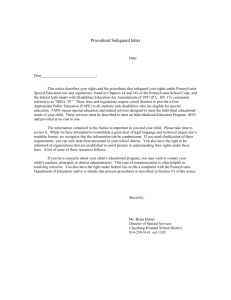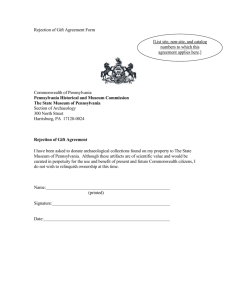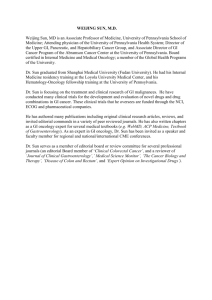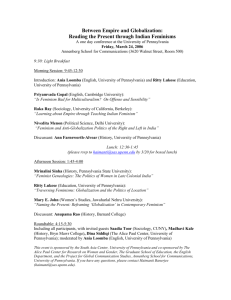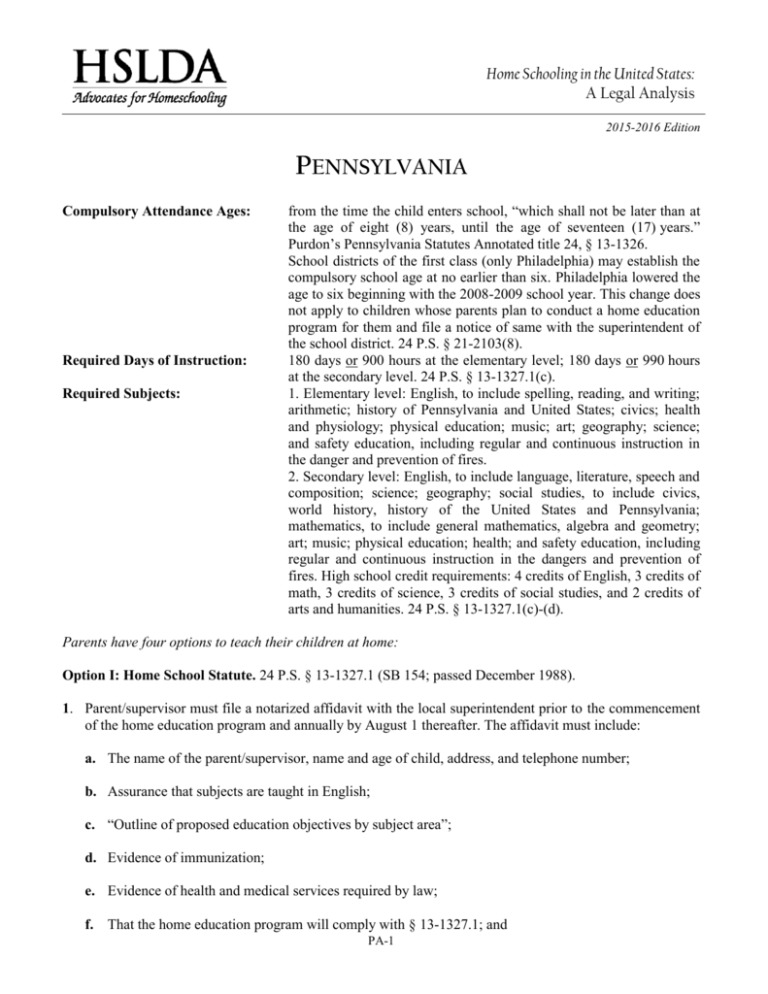
Home Schooling in the United States:
A Legal Analysis
2015-2016 Edition
PENNSYLVANIA
Compulsory Attendance Ages:
Required Days of Instruction:
Required Subjects:
from the time the child enters school, “which shall not be later than at
the age of eight (8) years, until the age of seventeen (17) years.”
Purdon’s Pennsylvania Statutes Annotated title 24, § 13-1326.
School districts of the first class (only Philadelphia) may establish the
compulsory school age at no earlier than six. Philadelphia lowered the
age to six beginning with the 2008-2009 school year. This change does
not apply to children whose parents plan to conduct a home education
program for them and file a notice of same with the superintendent of
the school district. 24 P.S. § 21-2103(8).
180 days or 900 hours at the elementary level; 180 days or 990 hours
at the secondary level. 24 P.S. § 13-1327.1(c).
1. Elementary level: English, to include spelling, reading, and writing;
arithmetic; history of Pennsylvania and United States; civics; health
and physiology; physical education; music; art; geography; science;
and safety education, including regular and continuous instruction in
the danger and prevention of fires.
2. Secondary level: English, to include language, literature, speech and
composition; science; geography; social studies, to include civics,
world history, history of the United States and Pennsylvania;
mathematics, to include general mathematics, algebra and geometry;
art; music; physical education; health; and safety education, including
regular and continuous instruction in the dangers and prevention of
fires. High school credit requirements: 4 credits of English, 3 credits of
math, 3 credits of science, 3 credits of social studies, and 2 credits of
arts and humanities. 24 P.S. § 13-1327.1(c)-(d).
Parents have four options to teach their children at home:
Option I: Home School Statute. 24 P.S. § 13-1327.1 (SB 154; passed December 1988).
1. Parent/supervisor must file a notarized affidavit with the local superintendent prior to the commencement
of the home education program and annually by August 1 thereafter. The affidavit must include:
a. The name of the parent/supervisor, name and age of child, address, and telephone number;
b. Assurance that subjects are taught in English;
c. “Outline of proposed education objectives by subject area”;
d. Evidence of immunization;
e. Evidence of health and medical services required by law;
f. That the home education program will comply with § 13-1327.1; and
PA-1
Pennsylvania
PA-2
g. A certification that the supervisor, all adults living within the home, and persons having legal custody
of the children have not been convicted of certain criminal offenses within the past five years.
The affidavit “shall be satisfactory evidence” of compliance with the law. 24 P.S. § 13-1327.1(b)(1). “The
required outline of proposed education objectives shall not be utilized by the superintendent in
determining if the home education program is out of compliance.” 24 P.S. § 13-1327.1(b)(1).
2. Any student who has been identified under the federal Individuals with Disabilities Education Act (IDEA)
as needing special education services (excluding those identified as gifted and/or talented) must have his
home education program approved by a state-certified special education teacher or a licensed clinical or
certified school psychologist. The written approval must be submitted with the notarized affidavit. 24 P.S.
§ 13-1327(b)(2)(d).
3. Parent/supervisor must annually compile and maintain certain documentation:
a. A portfolio of records and materials. This includes a “log, made contemporaneously with the
instruction, which designates by title the reading materials used, samples of any writings, worksheets,
workbooks or creative materials used or developed by the student.” 24 P.S. § 13-1327.1(e)(1);
b. “An annual written evaluation of the student’s educational progress” by (1) a licensed psychologist,
(2) or a teacher certified by the state (with two years of teaching experience), (3) or a nonpublic
school teacher or administrator (who must have at least two years teaching experience in the last ten
years in public or nonpublic schools). At the request of the supervisor, persons with other
qualifications may conduct the evaluation with the prior consent of the local superintendent. The
evaluation shall be based on an interview and review of the portfolio, and it “shall certify whether or
not an appropriate education is occurring.” 24 P.S. § 13-1327.1(e)(2);
4. By June 30 each year, the parent/supervisor must submit to the local superintendent the certification from
an evaluator that the student is receiving an appropriate education. Additionally, if the superintendent has
a reasonable belief at any time during the school year that an appropriate education may not be occurring,
he may send a letter to the parent/supervisor requiring that an evaluation be conducted and that an
evaluator’s certification be submitted within 30 days. 24 P.S. § 13-1327.1(h.1) and (i.1).
5. “A home education program shall not be considered a nonpublic school under the provisions of this Act.”
24 P.S. § 13-1327.1(b).
Note: The previous statute to the one above which required the parent to be “properly qualified” and the
curriculum “satisfactory” was ruled unconstitutionally vague in a civil rights case brought by HSLDA, Jeffery
v. O’Donnell, 702 F. Supp. 516 (M.D. Pa. 1988). The Federal District Court stated: “...the threat to sensitive
First Amendment freedoms mandates judicial intrusion in the form of declaring the particular provision of the
law [as applied to homeschools] unconstitutional for vagueness.” Id. at 521. The Court further commented:
“...when First Amendment rights are affected by the enforcement of a statute, the state law will be held to a
higher standard of specificity than might be the case if purely economic regulation was at issue.” Id. at 519.
The Court also placed an injunction on defendant-school districts from prosecuting homeschoolers.
In an earlier decision in the same case on September 29, 1988, the Court stated that “parents have a
substantial constitutional right to direct and control the upbringing and development of their minor children.”
Jeffery v. O’Donnell, 702 F. Supp. 513, 515 (1988).
Pennsylvania
PA-3
Alternative Statutes Allowing Home Instruction:
Option II: Private Tutor. Parents may teach their children at home if they qualify as a “properly qualified
private tutor.” This is defined as “a person who is certified by the Commonwealth of Pennsylvania to teach in
the public schools of Pennsylvania; who is teaching one or more children who are members of a single
family; who provides the majority of the instruction to such child or children; and who is receiving a fee or
other consideration for such instructional services.” The private tutor must file a copy of his Pennsylvania
certification and the required criminal history record with the student’s district of residence superintendent. 24
P.S. § 13-1327(a).
Option III: Day School/Church School. Parents may teach their children at home if the home is an
extension or satellite of a religious day school. Since the law simply states a child must be “enrolled,” parents
may “enroll” their child in a religious day school, but teach them at home. According to 24 P.S. § 13-1327(b),
such a day school must do the following:
1. “A child enrolled in a day school which is operated by a bona fide church or other religious body, and the
parent, guardian or other person having control or charge of any such child or children of compulsory
school age shall be deemed to have met the requirements of this section if that school provides a
minimum of one hundred eighty (180) days of instruction or nine hundred (900) hours of instruction per
year at the elementary level or nine hundred ninety (990) hours per year of instruction at the secondary
level and:
a. At the elementary school level, the following courses are taught: English, to include spelling, reading
and writing; arithmetic; science; geography; history of the United States and Pennsylvania; civics;
safety education, including regular and continuous instruction in the dangers and prevention of fires;
health and physiology; physical education; music; and art.
b. At the secondary school level, the following courses are offered: English, to include language,
literature, speech and composition; science, to include biology and chemistry; geography; social
studies, to include civics, economics, world history, history of the United States and Pennsylvania; a
foreign language; mathematics to include general mathematics and statistics, algebra and geometry;
art; music; physical education; health and physiology; and safety education, including regular and
continuous instruction in the dangers and preventions of fires.”
2. “The notarized affidavit of the principal of any such school, filed with the Department of Education and
setting forth that such subjects are offered in the English language in such school, whether it is a nonprofit
organization, and that such school is otherwise in compliance with the provisions of this act, shall be
satisfactory and sufficient evidence thereof.”
3. “It is the policy of the Commonwealth to preserve the primary right and the obligation of the parent or
parents, or person or persons in loco parentis to a child, to choose the education and training for such
child. Nothing contained in this act shall empower the Commonwealth, any of its officers, agencies or
subdivisions to approve the course content, faculty, staff or disciplinary requirements of any religious
school referred to in this section without the consent of said school.” 24 P.S. § 13-1327(b)(2).
4. Day schools are required to furnish to the local school districts a list of the names and residence of all
children between six and 18 years of age enrolled in the school. This information must be provided at the
time of admission of the children to the school. Day schools are also required to report the name and date
of withdrawal of any student who is still of compulsory attendance age. Additionally, day schools are
Pennsylvania
PA-4
supposed to report any child who has been absent from school for three days without lawful excuse. 24
P.S. § 13-1332.
Option IV: Accredited Day School/Boarding School. Parents may teach their children at home if their child
is enrolled in an extension or satellite of a day or boarding school accredited by an accrediting association
which is approved by the State Board of Education. 24 P.S. § 13-1327(c).
Teacher Qualifications: Parent/supervisor must have a high school diploma or its equivalent if students are
not enrolled in a day school. 24 P.S. § 13-1327.1(a).
Standardized Tests: Students enrolled in a home education program (Option I) must be tested with a
nationally-normed standardized test approved by the PA Department of Education or the Statewide tests
administered to public school students in grades 3, 5, and 8. The results in mathematics and reading/language
arts or the results of the Statewide tests must be included in the annual portfolio. Tests shall not be
administered by the child’s parent or guardian. 24 P.S. § 13-1327.1(e)(1). MAP testing is not required.
Stobaugh, 757 F. Supp. at 656.
Approved tests are:
California Achievement Test
Comprehensive Testing Program (CTPIV)
Iowa Test of Basic Skills
Metropolitan Achievement Test
Peabody Achievement Individual Test – Revised Version
Stanford Achievement Test
Terra Nova
Woodcock Johnson Revised Tests of Achievement III
Woodcock-Johnson IV
Wechsler Individual Achievement Test III (WIAT-III)
Religious Freedom Protection Act: 71 P.S. § 2401, et seq.
Copyright 2015-2016, HSLDA, all rights reserved. May be reproduced only by permission.
THIS ANALYSIS DOES NOT CONSTITUTE THE GIVING OF LEGAL ADVICE.
Call or write to receive a free copy of HSLDA’s newsletter and membership application.
P.O. Box 3000 • Purcellville, VA 20134 • Phone: (540) 338-5600 • Fax: (540) 338-2733 • Website: www.hslda.org

